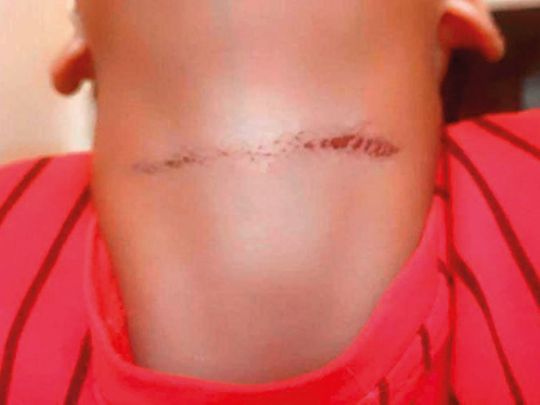
Ajman: A 13-year-old boy from Ajman has miraculously survived strangulation in a choking challenge known as ‘the pass out game’, which is spreading through UAE schools via social media platform Tik-Tok.
In the so called ‘game’ children tie a rope, belt or gutra around another child’s neck to see who can last the longest without breathing.
The challenge has been around for several years and has been blamed for multiple deaths internationally, but is now regaining popularity through Tik-Tok, a popular app to create and share short-form videos.
In this latest incident, which happened five days ago in an Ajman school, a 13-year-old Emirati boy named Rashid sustained serious injuries after one of his classmates tied the cord of his pants around his neck and pulled it to see how long he would last without breathing, his mother Hanan told Gulf News.
“Two days before the incident my son and I were talking about a video he had seen on Tik Tok, which showed the death of a girl who had challenged herself to see how long she could last not breathing with a rope around her neck,” Hanan told Gulf News.
“I told him not to try this dangerous game and warned him that it could lead to death.”
'His face had turned blue'
“My son came home from school and did not greet me as usual, then when I went to see him I was afraid to see his face had turned blue and there were bruises on his neck,” Hanan said recalling the incident.
“I was surprised to learn that his classmate had strangled him from behind using the cord of his pants. He didn’t notify the school and just told teachers that he had fallen when asked what had happened.”
Hanan decided not to take her child to hospital because it would have involved opening a police case against the other boy.
She insists that she doesn't want to involve the police or seek compensation but she does want other families to take greater care of their children, particularly with regard to their behaviour and what they look at online.
“By following the situation, I found that there is a great negligence on behalf of some families in monitoring their child’s behaviour. Their parents treat them with harshness and punish them for wrong deeds, which creates more aggressive behaviour, which they then pass on in school to their classmates, which is what happened in my son’s case,” she added.
'Awareness about choking challenge'
Hanan is now spreading awareness of the choking challenge among other parents to ensure there is no repeat of such incidents.
“I cannot blame the school or hold them responsible for what happened,” added the mother of six, including five boys and a girl. She said it was up to her to monitor them at home and follow up on any issues they may be experiencing in school.
Dr Abdul Wahid Al Wahidi, consultant general surgeon, head of the General Surgery Department and deputy technical director at Al Qassimi hospital, told Gulf News that the game is very dangerous.
If any person holds his/her breath for two minutes, it leads to brain damages and loss of consciousness. It harms and affects the brain cells and lead to loss of memory, he added.
Psychiatrist’s opinion
“It’s a well-known fact that adolescents are novelty seekers,” said Dr Mohammad Tahir, psychiatrist and neurologist, and chairman of the American Wellness Centre, Dubai, told Gulf News.
It’s a well-known fact that adolescents are novelty seekers. Two major things happen in the body: the body grows very fast but the mind doesn’t grow as fast. This deception puts adolescents at risk, hence the high lethal-to-incidence issues among adolescents
“Two major things happen in the body: the body grows very fast but the mind doesn’t grow as fast. This deception puts adolescents at risk, hence the high lethal-to-incidence issues among adolescents,” he added.
“They have a false sense of confidence when it comes to risky situations. They want to try something new. But it could also be that adolescents come under peer pressure and do the challenge because of it.”
Making children and teens aware of the risks of such challenges will help embolden them to take a stand and stay away from peers who entice them to participate.
Dr Tahir said people who are mentally challenged, who are at risk of being bullied, come from broken families with no proper guidance from family members, and children who have suffered from abuse are the most at risk to fall for these challenges.
Red Flags for parents, teachers:
- Any unusual behaviour in the child.
- Unusual marks in the body, especially around the neck. Do not be fooled if the child makes excuses for it. Take it very seriously. Probe more into it.
- They keep strings, belts, or scarves for no reason.
- If they look strangely ill, with blood-shot eyes or beaten up. After the challenge, some kids can have the appearance of being in shock or traumatised.
What to do if you find out your child a victim?
- Speak to them. Be empathic with the child. Tell them that they are not bad but it’s their behaviour that needs to be addressed. Assure them of your love and that you don’t want them to be harmed.
- Seek professional help to help the child deal with the trauma.
TikTok's response
Gita Ghaemmaghami, Regional Communications Director – MENA TikTok, said, "TikTok is committed to maintaining a safe and positive in-app environment for our users and in no way endorses or promotes videos that violate our Community Guidelines. Irresponsible trends that encourage dangerous behaviour are regrettably pervasive across the internet, but TikTok does not endorse nor tolerate content that features dangerous subject matter. We are actively investigating this and we are in the process of removing related harmful content. This is a complex, industry-wide challenge and we are consistently evaluating and strengthening our safety measures in our ongoing commitment to safeguard the well-being of our community."









